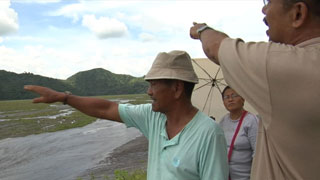Vapor Trail (Clark)
 USA, THE PHILIPPINES / 2010 / English, Tagalog / Color / Blu-ray (SD) / 264 min
USA, THE PHILIPPINES / 2010 / English, Tagalog / Color / Blu-ray (SD) / 264 min
Director, Photography, Sound, Producer: John Gianvito
Editing: John Gianvito, Eric Gulliver
Music: Georges Aperghis, Pierre Archambault, Giovanna Marini, Francesco de Gregori, Lav Diaz
Narration: Howard Zinn, Travis Wilkerson
Production Company: Traveling Light Productions
World Sales: Central Productions, Inc. www.centralproductions.org
At the sites of former U.S. military bases in the Philippines that were once vital staging areas for wars in Korea, Vietnam, and the Persian Gulf, local residents are suffering from serious health problems due to soil contamination by chemical agents. This film not only listens carefully to the voices of the struggling victims and their families, but also turns the camera on the battles and turbulent personal history of an activist who supports them, shining a light on the patterns of social inequality that have repeatedly emerged in the modern history of the Philippines, while showing the dignity of the oppressed. The film also incorporates photos depicting the nation’s historical relations with America in the late 19th century and analyzes the lingering influence of its subjugation. An homage to Tsuchimoto Noriaki.
[Director’s Statement] In the summer of 2006 I flew from Boston to Manila for the first time, intending to do preliminary research for a narrative feature, one segment of which I’d envisioned would eventually be filmed in the Philippines. What I experienced in those very first days propelled the jettisoning of that fictional project and led to a four-year endeavor to bring attention to the ongoing plight of the thousands of people living within the still toxic environs of the former U.S. military bases in the Philippines—the Clark Air Base and Subic Naval Base.
For nearly a century, these bases served as the largest U.S. military facilities outside the continental United States and the principal staging area for the Korean, Vietnam, and first Gulf Wars. Throughout this period, environmental regulation was reported to be extremely lax, and upon the 1991 U.S. evacuation, virtually no clean-up was undertaken. Decades of use across enormous tracts of land in the northern island of Luzon resulted in the land, the bay, and the forest area being littered with toxic chemicals, asbestos, and unexploded ordinance. Unfortunately this information was not made known to the tens of thousands of Filipino citizens who worked for years on the bases or who moved onto the base areas in the years following the U.S. departure.
The filming of Vapor Trail (Clark) included the simultaneous photographing of material, as yet unedited, for Wake (Subic), exploring the distinct though related health and environmental issues surrounding the former Subic Naval Base. As reported in The Boston Globe, “Virtually no part of the world is untouched by environmental hazards generated by the U.S. military. A recent Pentagon report cited environmental problems at bases in Greenland, Spain, Japan, Panama, Italy, Iceland, and the United Kingdom.” Thus, the subtitle of this diptych could be: “For Example, The Philippines.”
 John Gianvito
John Gianvito
Born in Staten Island, New York, in 1956, John Gianvito is a director, teacher, and curator based in Boston, Massachusetts. His films include the dramatic features The Flower of Pain (1983) and The Mad Songs of Fernanda Hussein (2001; recipient of the Jury Prize at the Buenos Aires International Festival of Independent Cinema, the first “Rosa Luxemburg Prize,” and Best Independent Film at the New England Film/Video Festival) and the documentary Profit Motive and the Whispering Wind (2007; awards include “Best Experimental Film of the Year” by the National Society of Film Critics [USA] and Grand Prize for Documentary Feature at the Belfort EntreVues Film Festival. Gianvito is the editor of the book Andrei Tarkovsky: Interviews (University Press of Mississippi). He served for five years in the 1990s as the film programmer of the Harvard Film Archive. |
